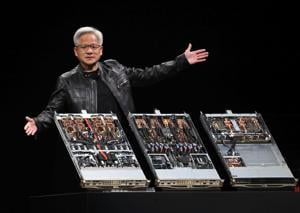Nvidia’s CEO, Jensen Huang, announced that the company has received approval from the Trump administration to resume sales of its advanced H20 computer chips to China. This development was disclosed in a company blog post late on Monday and highlighted during Huang’s appearance on China’s state-run CGTN television network.
In his remarks, Huang stated, “The U.S. government has assured Nvidia that licenses will be granted, and Nvidia hopes to start deliveries soon.” He further emphasized the significance of China in the global AI landscape, noting that “half of the world’s AI researchers are in China.” Huang expressed the importance of American companies being able to compete and serve the Chinese market, which he described as “innovative and dynamic.”
Strategic Meetings in Beijing
Huang’s announcement follows a recent meeting with Donald Trump and other U.S. policymakers. Currently in Beijing for the China International Supply Chain Expo, Huang is engaging with Chinese officials to discuss supply chain issues. During the event, he met with Ren Hongbin, the head of the China Council for Promotion of International Trade.
Nvidia has experienced substantial growth due to the rapid adoption of AI technology, becoming the first company to reach a market valuation of over $4 trillion last week. This achievement underscores the company’s pivotal role in the technology sector. Nevertheless, the ongoing trade rivalry between the U.S. and China has created challenges for the industry, with stringent U.S. export controls on advanced technology aimed at preventing potential military applications.
Impact of Export Controls
In January, the emergence of China’s DeepSeek AI chatbot raised alarms about the potential military uses of advanced AI capabilities developed with U.S. technology. The Biden administration established a new framework for exporting advanced computer chips in an effort to balance national security concerns with the economic interests of U.S. producers. In April 2023, the White House announced restrictions on the sale of Nvidia’s H20 chips, alongside AMD’s MI308 chips, to China.
Nvidia estimated that these tighter export controls would cost the company an additional $5.5 billion. In response, Huang and other technology leaders have been advocating for the reversal of these restrictions, asserting that such limitations hinder U.S. competitiveness in a crucial sector within one of the world’s largest technology markets. They also warn that these controls could inadvertently push other nations toward adopting China’s AI technologies.
Following the announcement, Nvidia’s U.S. traded shares saw a nearly 5% increase before the market opened, reflecting positive investor sentiment regarding the company’s prospects in the Chinese market.
This latest development signifies a crucial moment for Nvidia as it navigates the complexities of international trade and advanced technology in an increasingly competitive landscape.
